
Leonard Rossiter: A difficult man
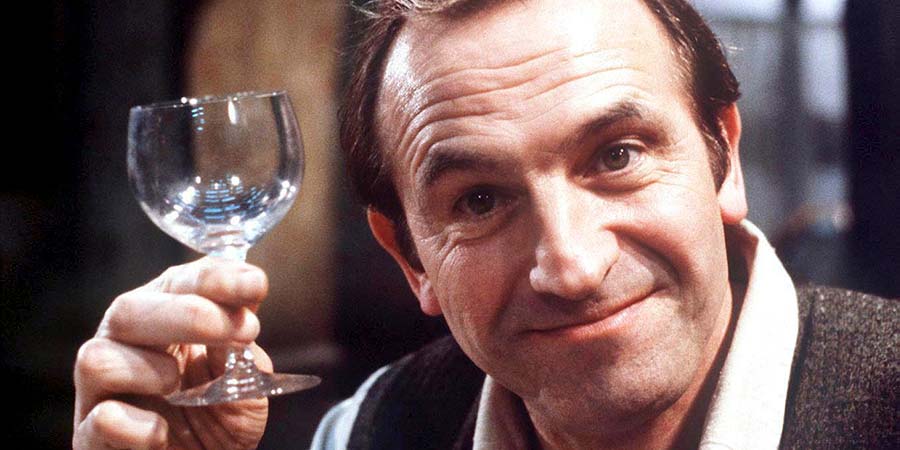
Leonard Rossiter was one of Britain's greatest sitcom stars, turning the seedily lascivious Rigsby of Rising Damp and the wistfully eccentric Reggie of The Fall And Rise Of Reginald Perrin into a couple of richly iconic comedy characters. He might, in fact, have made it a hat-trick of signature sitcom roles had it not been for his unrivalled ability to lose friends and irritate people.
He was brilliant at playing such 'difficult' individuals on the screen. With his ski-slope forehead that shone with the sheen of a chronically cold sweat; his dark, darting, ferrety eyes seemingly forever in search of a safe escape from threatening situations; his long and bony beak of a nose always poking into someone else's privacy; and his edgy, restless voice, which flitted nervously back and forth between a whiny falsetto and a dyspeptic baritone; he was a master of mimicking the misanthropic British misfit, the man most likely to niggle away at a nerve.
The problem was that he was equally adept at being such a difficult individual whenever he shook off his characterisations and stepped away from the screen. He was just a difficult individual, full stop.
The classic theatrical example of a man who could start an argument in an empty rehearsal room, Leonard Rossiter, whenever he started work on a new project, seemed to talk himself rapidly into trouble most of the times that he opened his mouth. Colleagues, critics, writers, directors, producers, employers, potential employers and ordinary members of the public - no one was spared from his bilious barbs.
A notorious and neurotic perfectionist who prided himself on his hard-earned achievements ('Oi - we put you where you are today, you know!' shouted one of the many autograph hunters he snubbed, only for Rossiter to snap back: 'Oh, believe me, you didn't. I put me where I am today!'), he suffered fools neither gladly nor glumly. He simply never suffered fools at all.
Thin, sharp-faced and fanatical about physical fitness (he once took his milkman with him on a family holiday so that he would have a suitable standard of squash partner to beat during his thrice-daily sessions), he had always been fiercely competitive and obsessively driven, a brilliant but tyrannical and intolerant actor who demanded that everyone associated with a production, from his fellow members of the cast to all of the technical crew, followed his instructions unquestioningly. Personality clashes on any production when Rossiter was involved were thus not a possibility - they were a certainty.
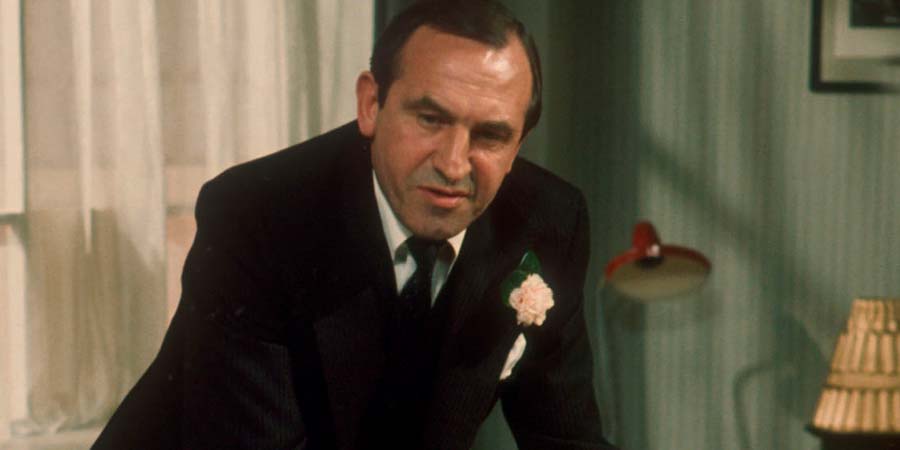
He knew that he was difficult. An exasperated Jonathan Lynn, after enduring the onerous task of directing him in a long-running theatrical production, once asked him why, seeing as nothing ever seemed right with the guidance he was getting, he did not just cut out the middle man and take charge of the proceedings himself. Rossiter shook his head sadly and explained: 'I tried directing once, and it was a disaster. I upset everybody, because I couldn't understand why they couldn't do it!'
It was this remorselessly and recklessly combative attitude that almost killed his sitcom career before it had really started.
In the history of British sitcoms, there are plenty of actors who have passed on a role, or were unavailable for a role, that would end up making someone else a star. There are only a few actors, however, who somehow contrived to have such a role handed to them on a plate only to hurl it away before the sitcom had even started. Leonard Rossiter was one of those actors.
In 1973, David Croft and Jimmy Perry, the co-writers of the hugely successful Dad's Army, were busy planning their next BBC sitcom, called It Ain't Half Hot Mum, set in a Royal Artillery Depot in Deolali, India, at the fag-end of the Second World War. The two men agreed that they wanted Rossiter to play the pivotal part of Battery Sergeant-Major 'Shut Up' Williams.
Croft would later claim that the actor was 'flavour of the month' at that time. This was something of an exaggeration: although, with the benefit of hindsight, one can certainly say that he was on the cusp of television stardom (as, in 1974, he would start appearing as Rigsby in Rising Damp, followed only a couple of years later by the first series of The Fall And Rise Of Reginald Perrin), he was currently still mainly known, aside from his stage work, for one-off dramatic roles on television in such series as Thirty-Minute Theatre and Play Of The Month.
Croft and Perry, however, certainly knew all about his talent and greatly admired his comedic skills. They had probably been most impressed by his recent guest appearance in an episode of Steptoe And Son (The Desperate Hours, 1972), in which he played an escaped convict with such conviction that Harry H. Corbett visibly raised his game to compete with such a powerful comic portrayal. Rossiter created the impression that his character could just as easily slit someone's throat as he could gift them a cigarette, and, from minute to minute, there was no way of knowing which option he would take. It was this ability to bring a sense of danger to the humour that Croft and Perry wanted for their own role of the bullying Sergeant-Major.
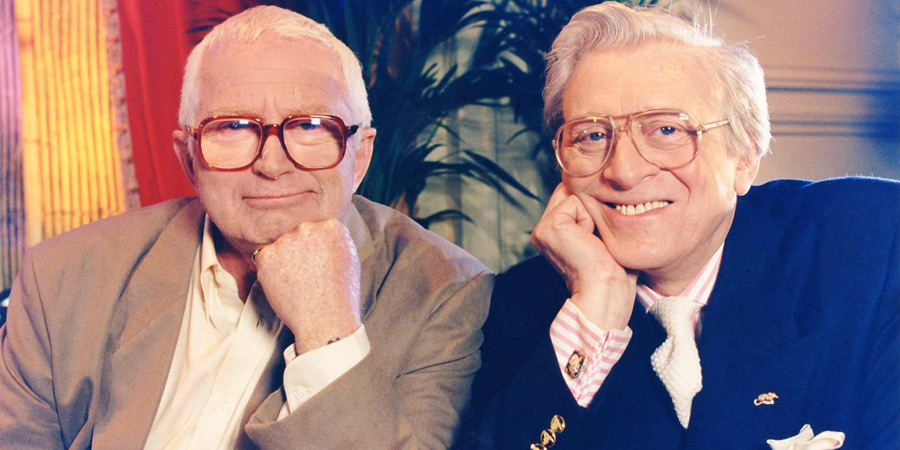
This was a character who needed to seem, initially, the stereotypical pigeon-chested, red-faced, fog-horned-voiced army Sergeant-Major, but who, in time, at times, could also appear bemused by the talents and values on show by the members of his concert party, and quietly respectful of their commitment to the cause, as well as, extremely discreetly, impressed by the odd performance that they managed to produce. It was not a part for someone who would simply embrace the one-dimensionality of the image; it was designed for someone who would seek to enlarge upon it and, to some extent, subvert it. Rossiter, it was felt, had just the right skill, and intelligence, to find the flesh for the bones.
Croft duly sent the pilot script to Rossiter's agent. The feedback was very positive: Rossiter, the agent said, had enjoyed what he had read, understood the potential of the role, and was keen to commit to the show. A delighted Croft then arranged to meet the actor for lunch at the BBC's Television Centre so that they could discuss the part and their plans for the show as a whole.
By this stage, with Dad's Army already established as a national institution, Croft and his partner Perry were used to getting their own way, and were therefore confident that Rossiter, like all of their previous recruits, would simply turn up, toast their new project over a glass or two of wine, and promptly sign up to join their impressive repertory company of talented character actors.
They could hardly have been more wrong.
A week later, Rossiter arrived at the BBC's base in White City and was greeted warmly in the foyer by Croft, and together they entered the lift to go up to his office on the fourth floor. When the shiny steel doors slid shut, the two men were all smiles.
Then the numbers took turns to light up: G...1...2...3...4. Ding!
When the doors slid back open again, a scowling Croft emerged, his snow-white hair now contrasting starkly with a reddened face that made his head resemble a large pot of over-ripe strawberries and cream. The arrival of each floor had seemed to trigger a new and darker shade in the colour chart of his emotions: 1 - cerise; 2 - rose; 3 - crimson; 4 - ruby. It was as if the lift was a microwave oven and out popped a piping hot Croft - Ding!
Being Rossiter-roasted was a new experience for the eminent producer-director. A famously phlegmatic man (known affectionately as 'The One-Take Major' by the actors with whom he worked) who never appeared even remotely rattled when presiding over the likes of the irrepressibly tetchy Arthur Lowe, the obdurately diffident John Le Mesurier or the hyper-active Clive Dunn, was now, for once in his life, visibly bubbling up with volcanic anger. The transformation was Hulk-like in its dramatic intensity.
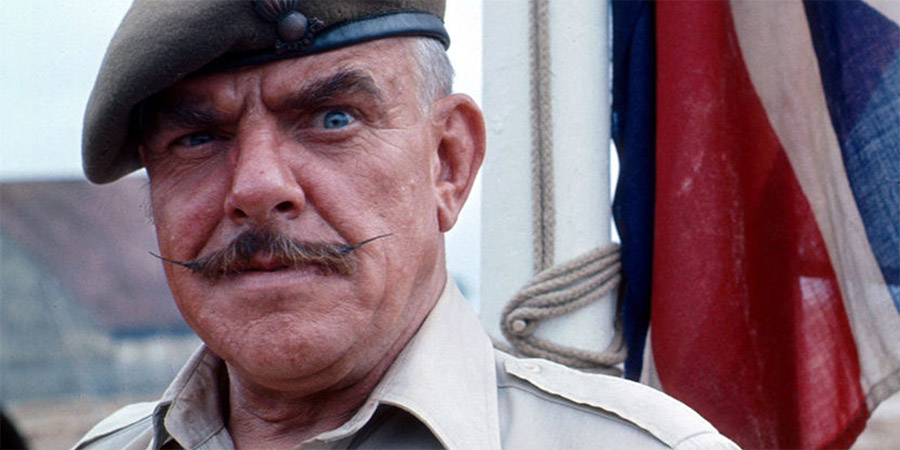
Gone was the genial producer welcoming yet another talented actor to his roster. In his place was a maddened manager who was adamant, silently but strongly, that there was absolutely no way that he would ever work with Leonard Rossiter on any project, let alone his next sitcom, and the offer was about to be brusquely withdrawn.
It turned out that the chronically intense actor had crammed so many criticisms, queries and demands into the forty seconds or so that it took the lift to go from the ground floor up to the fourth that Croft's admiration had swiftly turned to aversion, and Rossiter, neither for the first nor the last time, had talked himself straight out of a promising role. 'I asked him what he thought of the script,' Croft later explained, 'and he remarked that he had read it and passed a comment that there was "undoubtedly something there," though he thought the character fell into the trap of being a bit of a cliché'.
This had started Croft's cheeks heating up. 'There was something about his attitude that I found patronising,' he recalled, 'and I had to suppress a desire to say, "Thanks very much for coming to see us" and press the ground-floor button there and then'. Rossiter, however, was so wrapped-up in his own little moment that he was oblivious to the negative effect he was having on the all-powerful writer/director/producer, and carried on with his critique at a breathless pace.
Once they were out of the lift and on to the fourth floor, therefore, Croft, his lips clamped tight together like a clapperboard, walked silently to his office, with Rossiter still talking animatedly behind him. Once there, he introduced the actor, in a gruff monotone worthy of Captain Mainwaring, to his co-writer Jimmy Perry. Perry, glancing at Croft's angry red face, knew that something had gone horribly wrong, and, as Rossiter launched into a repetition of his rant from the lift, Perry soon realised why.
Perry, like Croft, was used to dealing with difficult and/or outspoken actors - Dad's Army's John Laurie, for example, routinely mined the mother lode of Celtic irascibility, and, ever since he first signed up to play Private Frazer, had never been hesitant about telling the writers what elements of a script were 'rrrrrrrrubbish' - and Perry often found such 'characters' rather amusing. Like Croft, however, he still expected these in-house critics to have a modicum of humility about them, as well as a healthy amount of respect for the writers, and Rossiter appeared to have neither.
'Oh God, that man!' Perry later exclaimed. 'That impossible man! He just didn't have a clue how to behave in that sort of situation!'
It probably only took a minute or so before Perry was as ready as his partner was to usher the actor back out of the office, along the corridor and straight back into the lift. 'He was quite ridiculous,' Perry recalled. 'He just moaned and moaned without taking a breath. He didn't notice that David had gone really, really quiet, or that I was repeatedly trying and failing to get a word in. He just kept on talking. I knew I had to get him out before David exploded!'
Eventually, Perry managed to catch the actor's attention, and, forcing a fake smile on to his face, leapt up and walked him out of the office. 'I had him by the elbow,' Perry later explained. 'I don't think he knew what was happening - he was still looking over his shoulder and talking at David - but I kept him moving!'
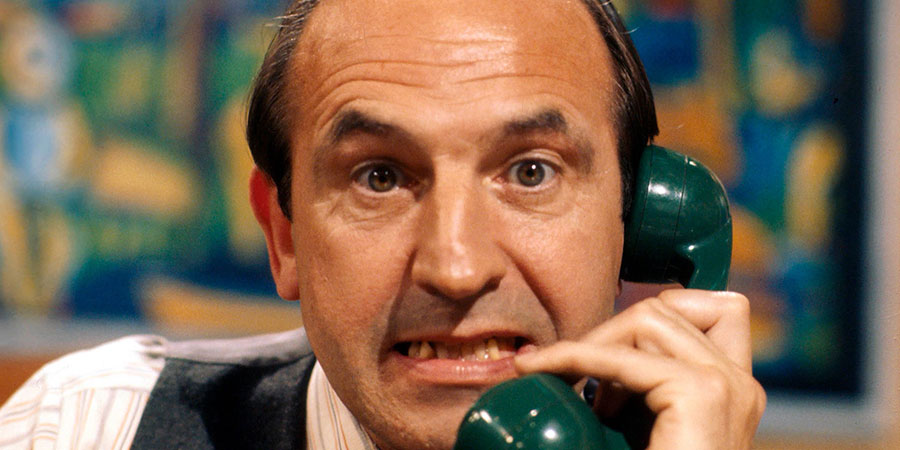
Croft, on this occasion, did not even bother to accompany Rossiter back down to the ground floor, and merely stood motionless at the door as an embarrassed-looking Perry ushered Rossiter hurriedly on into the distance.
The consequences of this clash of personalities would be twofold: for Rossiter, it would be the loss of a role, but for Croft the loss would arguably be greater. Instead of remaining open to the kind of actorly invention that had first drawn him to someone like Rossiter, the experience would have the effect of closing him up to further thoughts of experimentation. Control, it turned out, meant slightly more to David Croft than creativity.
'I came to the conclusion,' the producer would later explain, 'that Leonard Rossiter had a much bigger ego than I was prepared to deal with, having a pretty big ego myself. I could visualise endless rewrites to satisfy him, and rewrites were not something we were anxious to undertake'. He and Perry thus went ahead and chose Windsor Davies instead, and the part would make him a star, while Rossiter soon found fame himself elsewhere as Rigsby and Reginald Perrin.
Davies, ironically enough, would go on to commit all of the crimes that Rossiter had warned so strongly against, portraying the character, most of the time, as the kind of pop-eyed, neck-jerking, chest-jutting, bellowing stereotype that shattered any real chance of subtlety. It might well have been an accurate portrayal of certain real-life Sergeant-Majors, but, in a sitcom, it rendered the role little more than a pantomimic shout on stilts.
Rossiter had been right. Thanks to his stunning lack of social skills, however, he never had the chance to show it.
Croft, looking back, would remain adamant, none the less, that the right decision had been made. While Rossiter might well have brought greater complexity, he conceded, he would almost certainly have brought the kind of conflict and chaos that would, sooner rather than later, have wrecked any chances of the show's longevity. The producer concluded that, in his eyes at least, a star needs to work with the rest of the team, rather than against them, to make a sitcom that will last.
'A script must be true to the original concept of the writer,' Croft insisted, 'and,' he added curtly, 'we happened to be the writers'. Rossiter was simply too much of a meddler to respect that basic message. 'He played several notable parts wonderfully well afterwards,' Croft acknowledged, 'but I think I was right in believing he was unsuitable for a team show. The function of the actor is to interpret, not to mastermind rewrites'.
The ever-blinkered Rossiter, however, would remain baffled as to why the meeting had failed to secure him the part. As he stood in the lift, while the doors slid back together, he watched Croft's blank face disappear like a dot on an old TV set, and he was left feeling dazed and confused.
A little later, when his agent called to inquire how it had all gone, Rossiter, still sounding puzzled, merely replied: 'I don't know. I think someone must have upset them'.
Help us publish more great content by becoming a BCG Supporter. You'll be backing our mission to champion, celebrate and promote British comedy in all its forms: past, present and future.
We understand times are tough, but if you believe in the power of laughter we'd be honoured to have you join us. Advertising doesn't cover our costs, so every single donation matters and is put to good use. Thank you.
Love comedy? Find out moreRising Damp - The Complete TV Series Plus The Movie

Includes all 28 episodes from the TV series, plus the movie.
A genuine British comedy classic, the popularity of Rising Damp remains unparalleled some 25 years after the first transmission. Detailing the day-to-day events at Rigsby's dingy boarding-house in which the landlord from hell, Rupert Rigsby prowled around his dilapidated eyrie, poking his nose into his lodgers' affairs.
In the feature length movie, Rigsby (Leonard Rossiter) is still intending to make Miss Jones (Frances De La Tour) his wife but she's far more interested in the intellectual and athletic Philip (Don Warrington)...
First released: Sunday 31st August 2008
- Distributor: ITV Studios
- Region: 2
- Discs: 5
- Catalogue: 3711529413
![]() Buy and sell old and new items
Buy and sell old and new items
Search for this product on eBay
BCG may earn commission on sales generated through the links above.
It Ain't Half Hot Mum - Complete Collection

All the episodes of Jimmy Perry and David Croft's It Ain't Half Hot Mum, first broadcast in 1974. The series follows the exploits of a Royal Artillery Concert Party during the Second World War. Created by David Croft and Jimmy Perry, it seemed a natural follow-up to their smash hit Dad's Army. Another ensemble piece, it drew on both writers' wartime experience in India and set the action in Deolali: a British army camp 100 miles north-east of Bombay where everyone's gone "a bit doolally".
The concert party is a rag-tag collection of soldiers who'd rather sing, dance and drag up to entertain the troops than be sent forward to the front line. Characters include effeminate drag artist Gunner 'Gloria' Beaumont (Melvyn Hayes); the diminutive Gunner 'Lofty' Willie Sugden (Don Estelle) who possesses a hauntingly beautiful singing voice and ineffectual Colonel Reynolds (Donald Hewlett). However, the show's stand-out personality is the bombastic, eye-rolling Battery Sergeant Major Williams (Windsdor Davies).
Series 1, Episodes 4 and 6 are missing from BBC archives and included in their only surviving format, of off-air recordings from Australian television broadcasts. Each episode has had around four minutes cut to make space for the broadcaster's advert break.
First released: Monday 4th October 2010
- Distributor: 2 Entertain
- Region: 2 & 4
- Discs: 9
- Minutes: 1,647
- Subtitles: English
- Catalogue: BBCDVD3329
![]() Buy and sell old and new items
Buy and sell old and new items
Search for this product on eBay
BCG may earn commission on sales generated through the links above.
Guy Adams - Leonard Rossiter: Character Driven

Whether he was playing seedy landlord Rupert Rigsby in Rising Damp or frustrated suburban dreamer Reggie Perrin, Leonard Rossiter gave us performances so iconic, so utterly memorable, that they achieve timelessness. Like Peter Sellers or Ronnie Barker, his characters are more real in our national consciousness than the actor who played them, who to this day remains a mystery. There has never been a biography or autobiography, and the fragments we hear about him, e.g. his rumoured ruthlessness and disdain for other actors, are partial and don't offer any real insight into his undoubtedly complex character. This book will redress the balance, offering for the first time an in-depth account of Rossiter's life and work. Through interviews with his daughter, Camilla; widow, Gillian Raines; lover Sue MacGregor and friends and colleagues from Don Warrington to Geoffrey Palmer it will bring to life the man behind the threadbare cardigan and manic grimace and reveal why he was able to produce such epoch-defining performances.
As well as examining the great TV roles for which he became famous, the book also explores Rossiter's lesser-known work in theatre and his parts in classic films such as Lionel Bart's Oliver!, Stanley Kubrick's 2001: A Space Odyssey and Lindsay Anderson's Britannia Hospital. We'll also learn what went on behind the scenes in the famous series of Cinzano adverts he made with Joan Collins in the mid 1970s. Exhaustive, affectionate, honest and long overdue, Character Driven will finally give a personality to the man behind some of the greatest comic performances of the twentieth century.
First published: Monday 25th October 2010
- Published: Wednesday 1st December 2010
- Publisher: Aurum Press
- Download: 1.48mb
- Catalogue: 9781845136574
BCG may earn commission on sales generated through the links above.
- Publisher: Aurum Press
- Pages: 256
- Catalogue: 9781845135966
![]() Buy and sell old and new items
Buy and sell old and new items
Search for this product on eBay
BCG may earn commission on sales generated through the links above.
The Fall And Rise Of Reginald Perrin - The Complete Collection

This definitive collection includes all 21 episodes from the three series of The Fall And Rise Of Reginald Perrin, as well as an array of additional features which are new to DVD, including the post-Reggie series The Legacy Of Reginald Perrin and a special 1982 Christmas sketch.
The Fall And Rise Of Reginald Perrin remains one of the greatest comedies ever broadcast. From a terminally frustrated commuter who fakes his own suicide, to the boss of Grot, a shop selling useless junk, to running a commune for the middle-aged and the middle-class, Reginald Perrin - and his family and colleagues - provided a hilarious satire on modern life.
The magnificent performance of Leonard Rossiter held the series together, but the show also boasted David Nobbs' consistently witty scripts and a supporting cast of fantastic characters and a host of enduring catchphrases.
The series The Legacy Of Reginald Perrin (made after the sad death of Rossiter) saw the return of Jimmy, CJ, Tom, Doc and the others, as a deceased Reggie's will inspires them to do something totally and utterly absurd. And, from the BBC's The Funny Side Of Christmas (which featured festive versions of top comedy shows) comes a five-minute sketch of Reggie's Christmas Day.
The Comedy Connections documentary on the making of the series completes this comprehensive collection.
First released: Monday 27th April 2009
- Distributor: 2 Entertain
- Region: 2
- Discs: 5
- Catalogue: BBCDVD2365
![]() Buy and sell old and new items
Buy and sell old and new items
Search for this product on eBay
BCG may earn commission on sales generated through the links above.
- Released: Tuesday 5th May 2009
- Distributor: E1 Entertainment
- Region: 1
- Discs: 4
- Minutes: 630
- Subtitles: English
![]() Buy and sell old and new items
Buy and sell old and new items
Search for this product on eBay
BCG may earn commission on sales generated through the links above.

